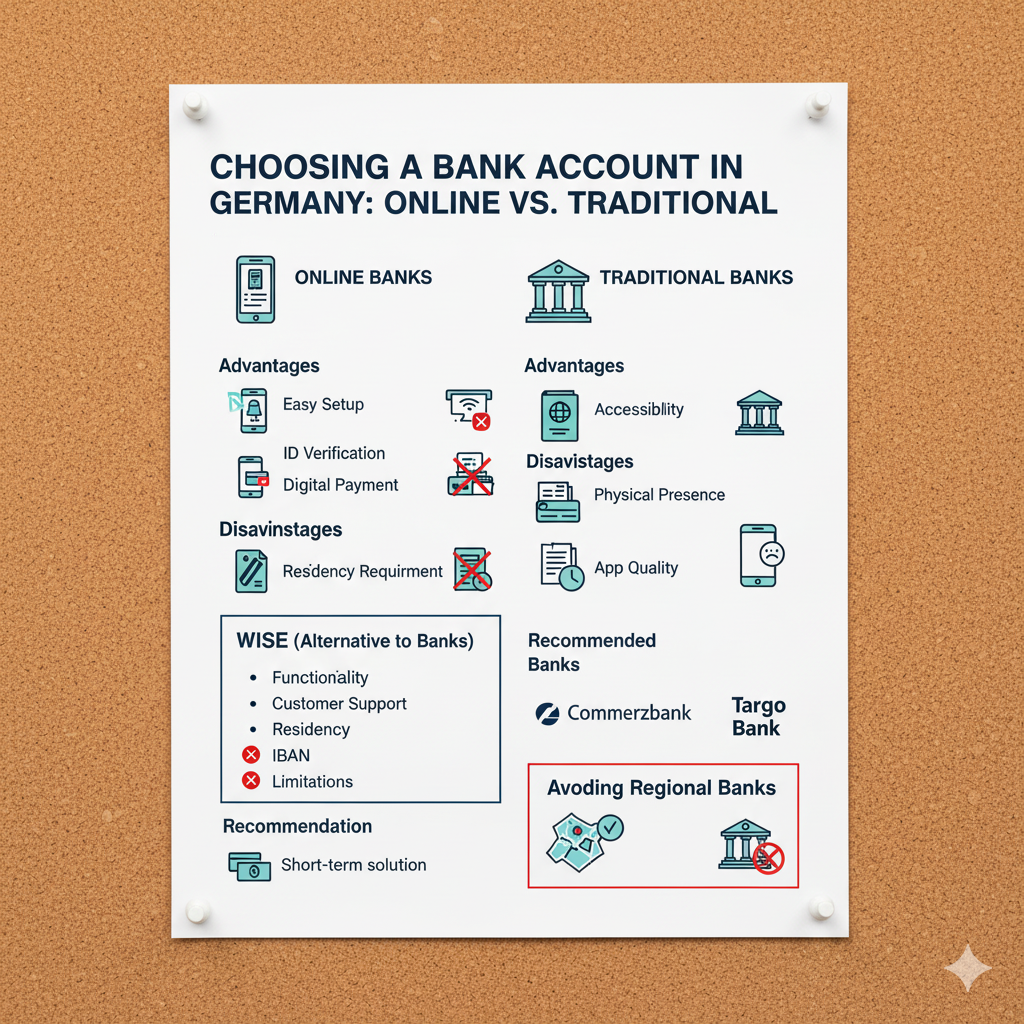Choosing a Bank Account in Germany: Online vs. Traditional
A comparison of online (digital) and traditional (physical) banking options in Germany for international students. Covers ease of setup, accessibility, the necessity of an *Aufenthaltstitel*, and the role of alternatives like WISE for short-term financial needs.

Bank Accounts in Germany
In Germany, students generally choose between two main types of financial institutions: traditional banks with physical branches and modern online (digital) banks.
Online Banks
Online banks offer convenience and modern features, but come with accessibility challenges for new arrivals.
Advantages:
- Easy Setup: Account opening is simple and can often be done entirely at home using a mobile app.
- Identity Verification: Usually involves filling out an online form followed by a video call to confirm your identity.
- Digital Payment: Offers digital cards compatible with Google Pay or Apple Wallet (provided your phone supports NFC).
- Fee Structure: Often allows a limited number of free ATM withdrawals per month (e.g., N26 allows 3 per month).
Disadvantages:
- Customer Support: Lacks physical branches. If your account is blocked (e.g., due to suspicious activity) or you have a complicated complaint, support is usually limited to chat or email, which can be frustrating.
- Residency Requirement: Most online banks require you to have an Aufenthaltstitel card (the physical residence permit card you receive after your first visa extension) to register. A visa sticker in your passport may not be sufficient.
WISE (Alternative to Banks)
WISE is a popular alternative, functioning similarly to a bank account but without official bank status in Germany.
- Functionality: Offers all standard banking functions: transferring and receiving money, paying for online and offline purchases, and receiving a Visa debit card.
- Residency: WISE generally does not require an Aufenthaltstitel; a passport is usually sufficient.
- IBAN: You will receive a Belgian IBAN (a standard account number format for the EU). This IBAN functions exactly the same way as a German IBAN for domestic transactions.
- Limitations: WISE is not a bank, so it does not offer services like interest rates or borrowing money. The money held in a WISE account falls under different guarantee schemes than those of a registered bank.
Recommendation: Use WISE as a short-term solution until you can open a traditional German bank account. It is advisable to avoid keeping large sums of money in your WISE account.
Traditional Banks
Traditional banks, such as Commerzbank or Deutsche Bank, require a more involved registration process but offer stability and accessibility.
Advantages:
- Accessibility: Accepts registration with just a student visa sticker in your passport. You do not need the Aufenthaltstitel card to open an account.
- Physical Presence: Having a local branch means you can physically go to an office to resolve complicated issues or blocked accounts.
Disadvantages:
- Hassle: The registration process is often more cumbersome, usually requiring an in-person visit to a local branch.
- App Quality: Mobile banking apps from traditional banks are often considered less user-friendly than those from digital banks like N26.
Recommended Traditional Banks
Based on student experience, Commerzbank and Targo Bank are good choices for international students.
- Commerzbank: Recommended as it is one of the largest banks with extensive nationwide branches. (Personal note: Its app is generally better than those of Targo Bank or Deutsche Bank.)
Avoiding Regional Banks
Avoid regional banks if you plan to move between cities for your Studienkolleg and university studies. Dealing with problems that require a physical visit will be difficult if the necessary branch is not located in your new city. Stick to nationwide banks.
Published on: 10/4/2025